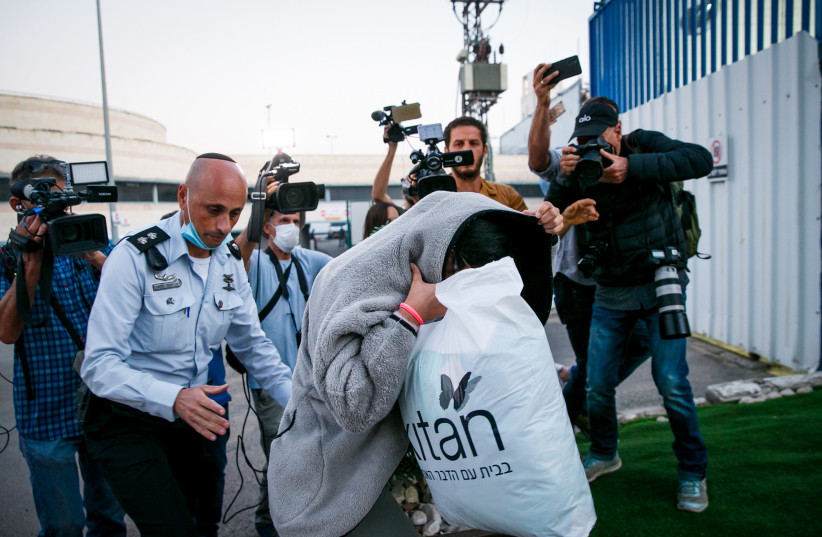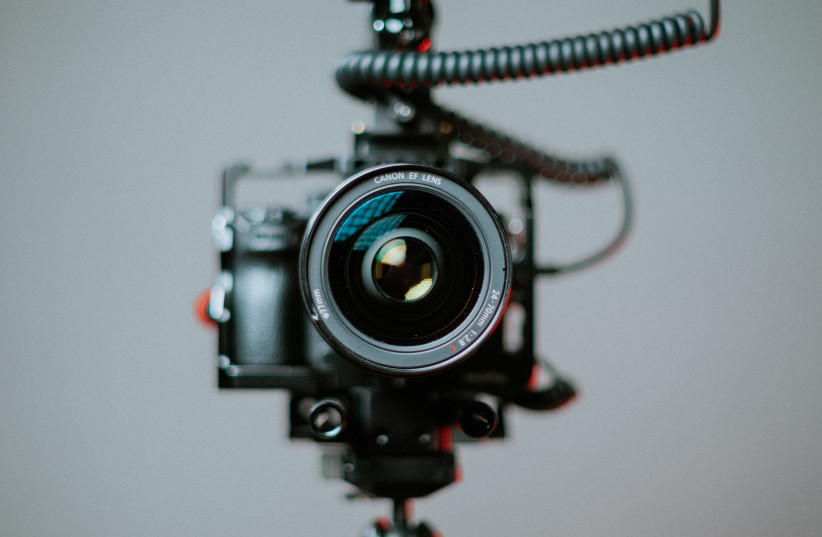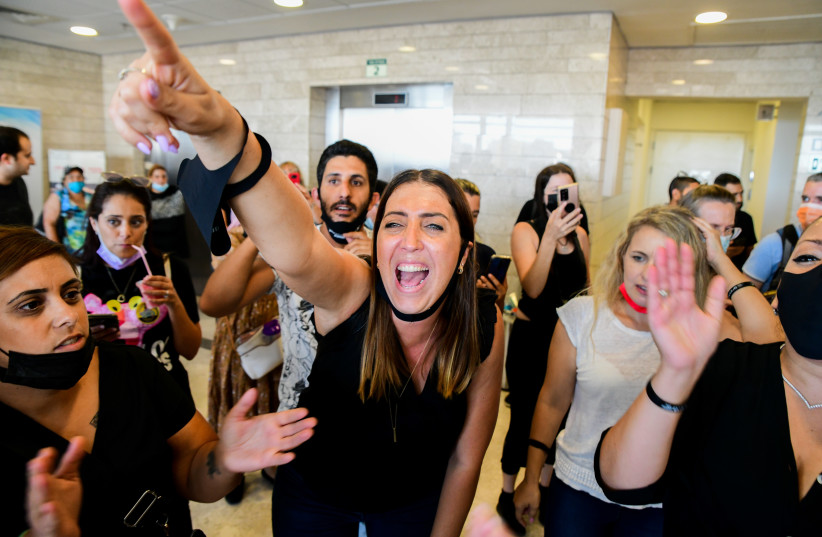IN 2019, Carmel Mauda was accused of abusing toddlers under her care in the daycare she ran in Lod. Last July, she stood trial and was sentenced to nine and a half years in prison.
In December, Mauda’s assistant, Liraz Natan, also stood trial and was sentenced to two years in prison for the part she played in abusing the children.
Although the case seemed uncommon at the time, it has become evident in the last few months that this was not an isolated incident but part of a frightening phenomenon.
In February, a few months after the Lod incident, mother and daughter daycare owners from Petah Tikva Orly Davidowitz and Danielle Leibovitz were also indicted for abusing the toddlers in their care. Security video footage showed both women regularly engaging in both physical and emotional abuse of the kids.
Since then, teachers from 14 different daycares around the country have been arrested for allegedly abusing the toddlers in their care. Daycares in Or Akiva, Rehovot, Petah Tikva, Hever, Kiryat Ata, Karmiel, Gadera and Kiryat Shmona were closed while the teachers from the remaining daycares are still being investigated. Most of them have had their arrests extended by the court while the investigations continue.

As in the case of Davidowitz and Leibovitz’s daycare, some of the footage that was taken from the others showed the teachers beating the children, handling them roughly and carrying them by their arms and legs while all the while yelling at them and calling them names.
The discoveries of the last few months have left parents feeling uneasy, to say the least.
“It makes me very worried,” said Shoshana, whose toddler is in a daycare with 14 other children. “It makes me wonder if my child is being abused in his daycare. When I know that there are other kids out there, and my son comes home with a bruise, I cannot help my mind going there and thinking ‘oh no, what if one of the teachers isn’t treating him okay?’ I know that that’s not the case, but it still crosses my mind – for sure.”
Sarah prefers to stay away from the news because she finds these reports very upsetting.
“It’s something I’m aware of, so I’m not turning a blind eye when it comes to my children, but I cannot hear the stories,” she said. “It upsets me that much.”
She feels safe sending her two kids to the daycares they are currently enrolled in, however, because she has heard great reviews and has had a good experience with them so far – but she will never feel “100% safe sending the kids to daycares.”
For Yael, the story has been terrifying, and she says it has made her more careful for the future.
“I’ve always been careful about where I send my kids anyway, but now I would want to know the daycare teachers or at least get good reviews from plenty of people that I know well,” she said.
According to Education Ministry Director-General Dalit Shtauber, there is no pattern to the daycares in which abuse was discovered, which range from private to public daycares and are located throughout the country.
<br>The Education Ministry
Until 2022, the responsibility for daycares belonged to the Labor, Social Affairs and Social Services Ministry, but at the beginning of the year, the Education Ministry took over authority for them. Since then, the ministry has been working on a number of plans to ensure proper supervision of daycares.
Although the Daycare Camera Law came into effect in 2018, there was not as much supervision before the Education Ministry took over – and not everyone who worked in them was required to have a degree.
Rina, who used to work in a couple of different daycares, relates that the first one had three roles, two of which did not require training in the field of education. In the second daycare, she said they did not require training at all, although now they have become stricter.

Cameras
In 2018, the Knesset passed the Daycare Camera Law that made it compulsory for every daycare to install security cameras in every area. The Education Ministry is now working to amend the law in order to make it easier for inspectors to view the footage at will and more often.
Furthermore, the ministry is acquiring a system that will connect every camera in every daycare to a single network.
“The moment a single camera stops working or goes offline, there will be an alert, and we will be notified immediately and send someone to inspect the daycare,” said Shtauber.
This means the daycares will be under constant surveillance as well as having the footage reviewed regularly.
<br>Licensing
Going forward, every daycare that looks after seven or more children will have to receive a license from the Education Ministry that will require them to comply with several criteria including a safe environment for the toddlers. They will not be able to remain open without the license.
The conditions of the daycare will be inspected by experts in toddler education from various fields and will be checked regularly.
Unfortunately, daycares of six toddlers or less are not legally defined as daycares and are not under the authority of the Education Ministry. This means that they will not be monitored, so the children will not be ensured as safe an environment as the rest.
While this may seem a significant factor for parents in deciding whether or not to send their children to a certain daycare, it is not common knowledge, but for some parents it would affect their decisions.
“I wouldn’t send my kids to a daycare of less than seven kids unless it was run by someone I personally know and trust,” said Shoshana.
Sarah would still prefer smaller groups because it would make her more comfortable regarding COVID-19 – and she feels that her kids could get more individualized attention – but the fact that there would be no government supervision would be very difficult for her.
“I think this information is very important, but I didn’t know,” said Yael. “Now that I do know, I would never send my kid anywhere that didn’t have proper supervision.”
It is, therefore, important that this information become well-known in order to enable parents to make the best and most informed choice for their children.
<br>Training teachers
The Education Ministry has started a program to train daycare teachers thoroughly, meaning that both the daycare itself and the teachers who work in or run it will have to be licensed.
“The courses have been built and the colleges have received a syllabus from the Education Ministry on what the program has to include,” said Shtauber. “This includes psychological care, nutrition, education and the relationship with the parents. “The lecturers will all be experts in toddler education and care.”
The program will also include training teachers to administer first aid care and about how to create a safe environment for toddlers.
The course is compulsory, and daycare teachers will not be allowed to hold the job if they do not complete it. It will be free of charge, and its participants will receive a bonus upon it’s completion.
“We estimate that by the end of the year, more than 10,000 teachers will be fully trained,” Shtauber said.

Dealing with cases of abuse
Once an incident of abuse is discovered in a daycare, the teacher is blacklisted and will never be able to work with children of that age again.
“The Education Ministry has a system for kindergarten teachers that will now involve daycare teachers too, and the moment a teacher has a complaint filed against her, she’s blocked in the system,” the ministry’s director-general explained. “Even if she moves to a different city and wants to get a job, the moment you put in her details, it shows she’s blocked and she cannot get the job.”
As for the parents and children, she explained that the ministry supports them through the process.
“When a case of abuse is discovered in a daycare, the anxiety levels of the parents rise exponentially, and so do feelings of guilt – and they really need help,” she said. “Therefore, our advisors support the entire group of parents from the daycare that was harmed. They help show them how to behave, what to say to the children and provide general advice.”
For the children, “it depends on the incident and the age of the child,” she said. “We have a psychological service that supports everyone involved.”
The Education Ministry’s new responsibility over the daycares is an important step forward in the process of ending abuse and preventing any more, but it remains to be seen whether the new reforms will be properly implemented and if they will help prevent future abuse. One can only hope that parents will be able to send their children to daycares with the knowledge that they are being well cared for. ■
